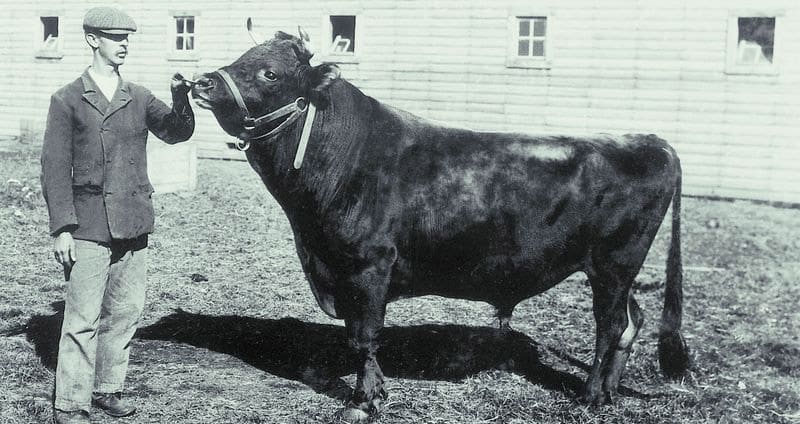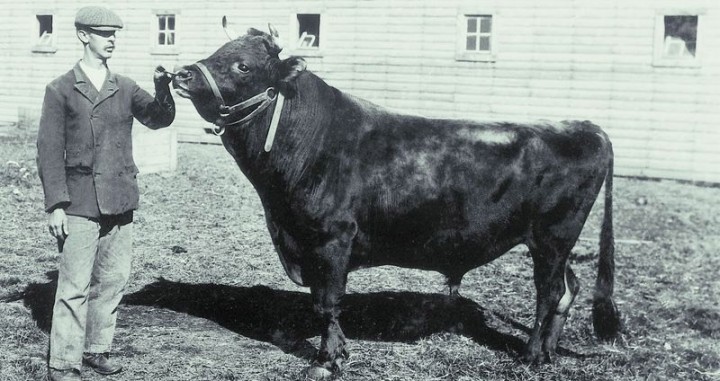History
When a Bull Wasn’t a Bull
Welcome to the January 2014 edition of Jud’s New England Journal, the rather curious monthly musings of Judson Hale, the Editor-in-Chief of Yankee Magazine, published since 1935 in Dublin, N.H When a Bull Wasn’t a Bull Years ago, New Englanders were very careful when speaking about sex and romance…… We New Englanders may be noted […]

Welcome to the January 2014 edition of Jud’s New England Journal, the rather curious monthly musings of Judson Hale, the Editor-in-Chief of Yankee Magazine, published since 1935 in Dublin, N.H
 When a Bull Wasn’t a Bull
Years ago, New Englanders were very careful when speaking about sex and romance……
We New Englanders may be noted for calling a spade a spade but all of us country people pushing eighty and beyond remember we never, for instance, referred to a bull as a bull when ladies were around. And I believe ladies didn’t refer to a bull directly either – even in all-female company. I recall the two farmhands we had on our Vanceboro, Maine, farm hand milking our some fifty Guernsey and Holstein cows (this was during the 1930’s, prior to milking machines) and chatting away about farm sexual matters and even sex in general – until my mother or my sister happened into the barn. Then our bull would become “the gentleman cow” or “he one” or just plain “him”. I recall that “the old gentleman” was occasionally used, too.
One just didn’t use words with “carnal overtones”, as it was sometimes put. So, as I’ve said, a bull wasn’t a bull and you didn’t mention chicken “breasts” or, for that matter, chicken “thighs” or “legs”, either. Women didn’t “sweat”. They “glowed” or perhaps “glistened”.
I guess this sort of “verbal restraint” influenced how people thought about sexual matters – or perhaps I should say didn’t think about sexual matters. Otherwise I would find it difficult to explain a little advertisement I have stashed away in my files, taken from a nineteenth-century newspaper on Nantucket Island. Before reading it, one should remember that many women on Nantucket were alone in those days for months and even years while their husbands were off whaling in the oceans around the world. The ad reads: “Wanted: A job. I will sleep in the homes of timid women for 15 cents a night or two nights for a quarter.” There’s a lovely sort of old-fashioned innocence about that little advertisement.
Of course, once you’re comfortable with some sort of theory about New England, you’ll soon encounter something that’ll blow it to smithereens. For instance, have you ever seen the plain marble slab on the site of Brigham Young’s birthplace in Wilmington, Vermont? I haven’t in years but I assume it’s still there. On the tablet is written, “Brigham Young, born on this spot in 1802, a man of much courage and splendid equipment.”
Well, maybe that was innocent, too. Think so?
When a Bull Wasn’t a Bull
Years ago, New Englanders were very careful when speaking about sex and romance……
We New Englanders may be noted for calling a spade a spade but all of us country people pushing eighty and beyond remember we never, for instance, referred to a bull as a bull when ladies were around. And I believe ladies didn’t refer to a bull directly either – even in all-female company. I recall the two farmhands we had on our Vanceboro, Maine, farm hand milking our some fifty Guernsey and Holstein cows (this was during the 1930’s, prior to milking machines) and chatting away about farm sexual matters and even sex in general – until my mother or my sister happened into the barn. Then our bull would become “the gentleman cow” or “he one” or just plain “him”. I recall that “the old gentleman” was occasionally used, too.
One just didn’t use words with “carnal overtones”, as it was sometimes put. So, as I’ve said, a bull wasn’t a bull and you didn’t mention chicken “breasts” or, for that matter, chicken “thighs” or “legs”, either. Women didn’t “sweat”. They “glowed” or perhaps “glistened”.
I guess this sort of “verbal restraint” influenced how people thought about sexual matters – or perhaps I should say didn’t think about sexual matters. Otherwise I would find it difficult to explain a little advertisement I have stashed away in my files, taken from a nineteenth-century newspaper on Nantucket Island. Before reading it, one should remember that many women on Nantucket were alone in those days for months and even years while their husbands were off whaling in the oceans around the world. The ad reads: “Wanted: A job. I will sleep in the homes of timid women for 15 cents a night or two nights for a quarter.” There’s a lovely sort of old-fashioned innocence about that little advertisement.
Of course, once you’re comfortable with some sort of theory about New England, you’ll soon encounter something that’ll blow it to smithereens. For instance, have you ever seen the plain marble slab on the site of Brigham Young’s birthplace in Wilmington, Vermont? I haven’t in years but I assume it’s still there. On the tablet is written, “Brigham Young, born on this spot in 1802, a man of much courage and splendid equipment.”
Well, maybe that was innocent, too. Think so?
 When a Bull Wasn’t a Bull
Years ago, New Englanders were very careful when speaking about sex and romance……
We New Englanders may be noted for calling a spade a spade but all of us country people pushing eighty and beyond remember we never, for instance, referred to a bull as a bull when ladies were around. And I believe ladies didn’t refer to a bull directly either – even in all-female company. I recall the two farmhands we had on our Vanceboro, Maine, farm hand milking our some fifty Guernsey and Holstein cows (this was during the 1930’s, prior to milking machines) and chatting away about farm sexual matters and even sex in general – until my mother or my sister happened into the barn. Then our bull would become “the gentleman cow” or “he one” or just plain “him”. I recall that “the old gentleman” was occasionally used, too.
One just didn’t use words with “carnal overtones”, as it was sometimes put. So, as I’ve said, a bull wasn’t a bull and you didn’t mention chicken “breasts” or, for that matter, chicken “thighs” or “legs”, either. Women didn’t “sweat”. They “glowed” or perhaps “glistened”.
I guess this sort of “verbal restraint” influenced how people thought about sexual matters – or perhaps I should say didn’t think about sexual matters. Otherwise I would find it difficult to explain a little advertisement I have stashed away in my files, taken from a nineteenth-century newspaper on Nantucket Island. Before reading it, one should remember that many women on Nantucket were alone in those days for months and even years while their husbands were off whaling in the oceans around the world. The ad reads: “Wanted: A job. I will sleep in the homes of timid women for 15 cents a night or two nights for a quarter.” There’s a lovely sort of old-fashioned innocence about that little advertisement.
Of course, once you’re comfortable with some sort of theory about New England, you’ll soon encounter something that’ll blow it to smithereens. For instance, have you ever seen the plain marble slab on the site of Brigham Young’s birthplace in Wilmington, Vermont? I haven’t in years but I assume it’s still there. On the tablet is written, “Brigham Young, born on this spot in 1802, a man of much courage and splendid equipment.”
Well, maybe that was innocent, too. Think so?
When a Bull Wasn’t a Bull
Years ago, New Englanders were very careful when speaking about sex and romance……
We New Englanders may be noted for calling a spade a spade but all of us country people pushing eighty and beyond remember we never, for instance, referred to a bull as a bull when ladies were around. And I believe ladies didn’t refer to a bull directly either – even in all-female company. I recall the two farmhands we had on our Vanceboro, Maine, farm hand milking our some fifty Guernsey and Holstein cows (this was during the 1930’s, prior to milking machines) and chatting away about farm sexual matters and even sex in general – until my mother or my sister happened into the barn. Then our bull would become “the gentleman cow” or “he one” or just plain “him”. I recall that “the old gentleman” was occasionally used, too.
One just didn’t use words with “carnal overtones”, as it was sometimes put. So, as I’ve said, a bull wasn’t a bull and you didn’t mention chicken “breasts” or, for that matter, chicken “thighs” or “legs”, either. Women didn’t “sweat”. They “glowed” or perhaps “glistened”.
I guess this sort of “verbal restraint” influenced how people thought about sexual matters – or perhaps I should say didn’t think about sexual matters. Otherwise I would find it difficult to explain a little advertisement I have stashed away in my files, taken from a nineteenth-century newspaper on Nantucket Island. Before reading it, one should remember that many women on Nantucket were alone in those days for months and even years while their husbands were off whaling in the oceans around the world. The ad reads: “Wanted: A job. I will sleep in the homes of timid women for 15 cents a night or two nights for a quarter.” There’s a lovely sort of old-fashioned innocence about that little advertisement.
Of course, once you’re comfortable with some sort of theory about New England, you’ll soon encounter something that’ll blow it to smithereens. For instance, have you ever seen the plain marble slab on the site of Brigham Young’s birthplace in Wilmington, Vermont? I haven’t in years but I assume it’s still there. On the tablet is written, “Brigham Young, born on this spot in 1802, a man of much courage and splendid equipment.”
Well, maybe that was innocent, too. Think so?


